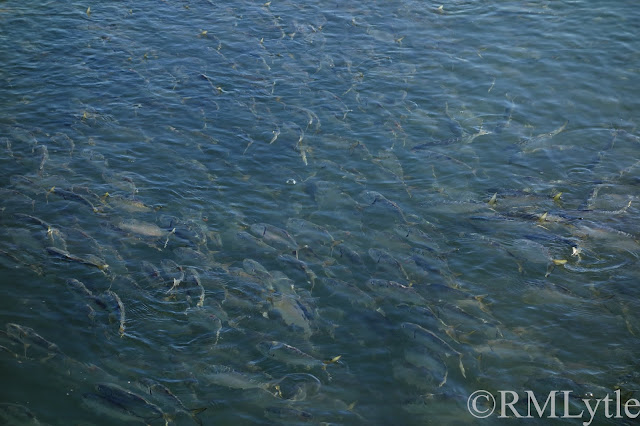This November and December have been highlighted by the largest biomass of adult menhaden I've ever seen locally. They were everywhere: tidal creeks were packed bank to bank, flats had roving schools, and there seemed to be a continuous unbroken line of menhaden from the Connecticut River to City Island.
One would think that with so much big bait around there'd be loads of predator fish on it. Nope. We don't have big stripers and big bluefish anymore, not enough to make something spectacular happen with so much adult bunker. There is definitely such a thing as too much bunkah. Now, if there'd been an equivalent mass of juvenile bunker around that long, there'd have never been no end to the schoolie blitzes. Those bunker are still here, actually, at least those the cold snaps haven't yet killed. I was out this Sunday and had thousands in front of me. There were also many that were dead and dying. It's unfortunate that so many menhaden seem to have gotten stuck in many of the warmer backwaters to die as it just gets colder and colder. The repetitive record breaking warm spells encouraged so many of them to overstay, the ocean temperatures are now colder than the mud flats so there is no escape.
 |
| Oh how I wish those were bluefish tails. |
On only two days was I so lucky as to find anything eating the bunker. One day, they were out of range, bass and maybe blues pushing them. I stopped and parked just to watch, I'd seen the blitz from the road. Little did I know I was missing a better show to my East: a couple humpback whales had found a school of bunker and were getting their fill.
A few days later I returned to the same area and this time found nervous bunker in tighter to the shore. I ran back to the car to gear up, heart pounding. Menhaden are huge baitfish and and usually if bass are on them, they aren't little schoolies. I tied on a long Slammer, but even that wasn't as at all as large as many of these menhaden.
With the bait so nervous, I was sure I'd soon see some large splashes or boils. Indeed I did, and there were clearly a number of large stripers visibly working the school.
I wanted my fly to stand out and look easy to catch, so I worked it with a very slow steady two hand retrieve and the occasional quick short burst. This drew strikes, but not from the 45 inch bunker filled cows I was hoping for. How sub-20 inch striper thinks a 10 inch long Slammer is small enough to snack on I do not know. I caught a number of them. It was certainly better than nothing, but my hopes for just on big surf bass in the 2020 season were crushed as they had already been many times.

Regardless, it was very nice to see some stripers on the adult bunker even though it should have been happening much more often this season. Big bait and big predators is a very exciting dynamic for obvious reasons. Hopefully the fishery will return to it's former glory so more anglers can experience such things, myself included. It's up to us to be good stewards of the species as well as the habitat and food sources they require. Stop eating stripers if you still do, don't use fish oil products mad from menhaden oil, and limit your impact by using barbless single hooks and intentionally catching fewer fish than you could.
Fish for the love of fish.
Fish for the love of places fish live.
Fish for you.
And stay safe and healthy.
Thank you to my Patrons; Erin, David, John, Elizabeth, Brandon, Christopher, Shawn, Mike, Sara, Leo, C, Franky, and Geof for making Connecticut Fly Angler possible.













That's a lot of fish. Sad to see many go to waste. The warming takes it's toll in many ways.
ReplyDeleteI hope we can turn this around.
Tie, fish, write, conserve and photo on...
Nothing dead goes to waste in the ocean. Menhaden are important forage whether alive or dead for countless species.
DeleteThe abundance of bunker along the CT shoreline right up to this past week has been remarkable! Hopefully all of the nutrients that they are now leaving behind will feed new life. Thanks for sharing your adventures!
ReplyDeleteMy hopes exactly!
DeleteThis is a remarkable account from an environmental standpoint, and instructive for those who fish. Thanks for sharing your observations in such well-crafted words and photography. Hope you catch up with those whales soon!
ReplyDeleteThanks. Those whales are long gone and potentially hundreds if not thousands of miles away, unfortunately.
Delete